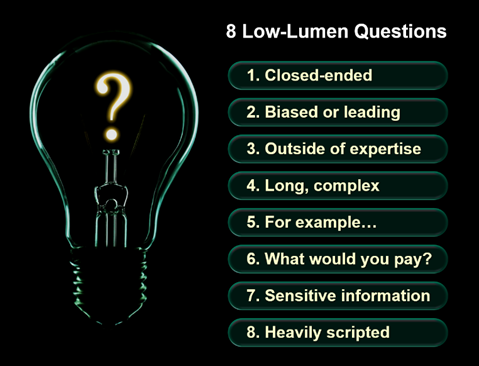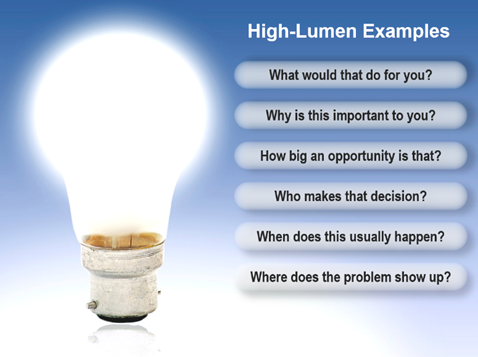1. High-lumen and low-lumen probing questions
8 Types of questions to avoid during your interviews.
In old-fashioned voice-of-customer (VOC), you develop a long list of brilliant questions. With B2B-optimized Blueprinting interviews, you learn how to brilliantly probe whatever the customers says. They are the ones leading the interview, not you.
If you’re not careful, the nature of your probing questions can seriously impair your interview. At worst, the customer will become disinterested. At best, your questions simply won’t shed much “light” on the subject. Avoid these 8 low-lumen question types:

- Closed-ended: This question can be answered with a yes or no, or other simple answer. Open-ended questions—which might begin with “why” or “how”—stimulate much more thoughtful responses.
- Biased or leading: Questions like, “We’re excited about this technology, but wanted to get your opinion,” create two problems. First, you probably won’t get a straight answer. Second, it becomes clear to the customer that you’re more interested in “validating” your view than understanding his.
- Outside of expertise: If you ask many questions outside the customer’s area of expertise, you run the risk of embarrassing him or her.
- Long, complex: Don’t use complicated questions: “Given that global economic trends continue at their current pace, and considering the markets you’re in today, and assuming you’re still awake when I finish my question…” Keep your questions short and crisp.
- For example: Be careful about adding “for example” to the end of your question. I find interviewers do this when they are afraid of silence, or don’t think the customer can answer the question without help. Just ask a simple question, e.g. “Any other problems?”… and wait patiently for the answer.
- What would you pay?: When customers hear this question, a switch flips inside their heads to move them into "negotiating mode." They say, “Ahh… this interviewer just moved from “I’m interested in you” to “How much can I get you to pay for this?” It’s unlikely you’ll get a straight, unfiltered answer from the customer… and you probably won’t get him back into an open conversation either.
- Sensitive information: They may not be comfortable talking about competitive information, proprietary technology or their financial performance. If it’s important to you and you’re not sure if it’s sensitive to them, at least wait until the end of the interview to ask.
- Heavily scripted: You’ve got your 17 questions by golly… and you’re going to march through them regardless of what comes out of the customer’s mouth. This lack of spontaneity and responsiveness might work for a consumer-goods survey, but it completely fails to take advantage of the knowledge, objectivity and interest of B2B customers.
You will do much better in your interview with high-lumen questions: “What would that do for you?” “Why is this important to you?” Can you see how such questions encourage deeper thinking and more complete responses?

For more, see e-Module 12: Probing Skills at www.blueprintingcenter.com > e-Learning.
Keywords: probing skills, probing questions, high-lumen questions, low-lumen questions, VOC, voice of customer, closed-ended question, biased question, leading question, what would you pay, heavily scripted question, asking for sensitive information, what, why, when, where, how, who